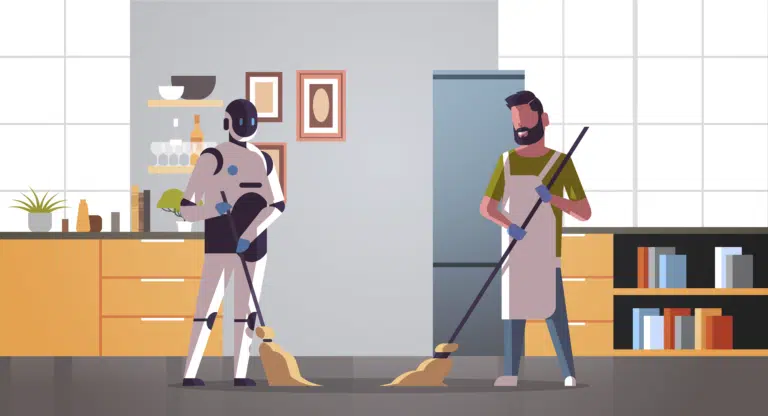Robotics and automation have had a profound impact on several industries. Manufacturers have used robotics since the early 1980s for a variety of tasks. Distribution and fulfillment centers are experiencing an influx of robotics to assist in loading, unloading, picking, and sorting. Robots are also influencing the medical (surgical robotics), agriculture (GPS tractors and harvesters), and mining (drilling) industries.
While robotics and automation are greatly impacting certain segments, the janitorial and cleaning industry still largely relies on humans to complete most tasks. However, there are some innovations currently being tested that may impact the industry in the future. The following describes some of the items currently being tested.
- Robotic Floor Scrubbers/Vacuums: Nilfisk, TASKI, Avidbots, and Cyberdyne have developed, or are developing, robotic solutions for floor scrubbers and vacuum cleaners. These models are better suited for large open spaces such as you might find in education facilities, hospitals, airports, and convention centers. These machines utilize GPS and AI technologies to map out areas of service.
- Consumable Products Level Sensors: Consumable supply companies are currently developing technology that will alert custodial staff when levels of soap, toilet paper, and paper towels are getting low. These “smart dispensers” will submit signals to the cleaning staff when dispensers are low.
- Trash Level Sensors: Using similar technology as the “smart dispensers,” a monitor keeps track of how full a trash can is and sends that status to the cleaning team. When the bin is getting full, the cleaning team is alerted to provide service.
Now for the good news and the bad news!
First, the good news! This technology is being tested, and if implemented, could save significant labor hours associated with riding and guiding a floor scrubber or constantly checking the levels of trash and consumables. When fully implemented, this technology could reduce custodial labor costs and improve quality.
Now, the bad news. This technology is cost prohibitive for most users. However, as with most types of technology, the cost of these items will decline as the technology is perfected and these items have more widespread usage.
So, until these items are more affordable, below are some ways that you can save some dollars on your custodial spend:
- Centralized collection points for trash: Position large trash collection bins throughout your facility and ask your team members to take their trash to the collection bins. Have trash can liners available at your collection points so that your team members can place a new liner in their trash can. Your cleaning vendor should be able to reduce their man-hours if they only must empty a few large bins versus dozens of small trash containers.
- Install hand dryers in restrooms: Installing hand dryers in restrooms is a decision that should be carefully considered based on your setting. However, from simply a janitorial man-hours perspective, installing hand dryers eliminates a great deal of trash collection and removal from restrooms. In addition, the reduced towel usage decreases the time needed to refill hand towel dispensers.
- Install large roll toilet tissue dispensers: This idea is basic: larger rolls should lead to fewer times having to refill dispensers, which should decrease janitorial labor hours slightly.
- Employee participation in cleaning: Many companies are already employing this strategy. That is, having their own team members clean their office or cubicle area. In other words, you might ask everyone to dust their own work space or clean and disinfect their own telephone.
It is unlikely that robotics or other technologies will significantly reduce the time needed to clean your facility for the foreseeable future. In the meantime, there are some steps that you can take to reduce the number of “human hours” needed to keep your facility looking and feeling clean.
